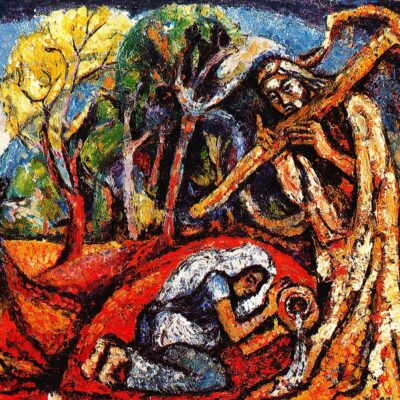Today we conclude our Fall Giving Campaign, “Gather in Gratitude, Go Forth in Good Courage.” I’m certain that the wonderful team who have coordinated our campaign, and indeed, many of you are expecting a sermon on gratitude and giving from your Vicar. So I started working on that.
And then I realized that, at least in intent, all my sermons are “gratitude and giving” sermons. Every time I preach, I pray and look for the good news in the readings, in our world and in my own life. It is the good news of God bringing light and life and love into our being that gathers us together in gratitude.
Each time I come to worship, I am listening for and longing to hear and experience the good news of God in Jesus. Some days are better than others. Yet, even when the sermon is mediocre or the music seems muted or the attendance is low, still the light shines, the dawn from on high breaks upon us and we experience good news.
Most of my sermons are also “giving” sermons. Week by week, we gather to listen for the call of Jesus on our lives. We hear the words of the prophets and apostles, we pay attention to the lives of the saints, we pray for courage, strength and guidance. And more times than not, the Spirit breathes on and in us, sometimes as a quiet presence, other times as a rushing wind, propelling us to go forth in good courage, to give of ourselves and all that we have to enact God’s love in our world. With the dismissal ringing in our ears, we consider how we might in both small and great, ordinary and extraordinary ways, offer ourselves and our gifts in love of God and for love of others.
I have now attempted to preach good news to the people of St. Luke’s, Ballard longer than I have to any other community in my ordained ministry, 7 years and 8 months. It turns out that this quirky little congregation is the fulfillment of my career and the beloved community of my heart.
Today is the final Sunday in the three-year lectionary cycle. Next week Advent begins and we start over again with the Gospel of Matthew and a new church year. It’s an opportunity to look both backward and forward, and the readings for today’s Feast of Christ the King Sunday are perfect for this.
In case you missed it, we didn’t recite a psalm today between the Old and New Testament lessons. In place of that we included one of the beautiful Canticles from Luke’s gospel, “The Song of Zechariah.” One of the reasons Luke makes such a perfect set of texts for Christmas pageants, lessons and carols is because Luke includes three beautiful, soaring canticles at the beginning of his gospel, “The Magnificat, or Song of Mary,” “The Benedictus, or Song of Zechariah,” and the “Nunc Dimittis, or Song of Simeon.”
These beautiful canticles along with a few others are some of the most moving passages from the Bible and have been part of the Church’s practice of Morning and Evening Prayer for centuries. They are chanted, set to music or recited prayerfully every day in grand cathedrals, humble parish churches or in homes around the world.
When we want to express gratitude, we sing. When we need courage to protest and march against injustice, we sing. When we are near the end and our senses are failing, others may sing us through the valley of the shadow on to the other side.
During lockdown and for nearly two years, gathering together to sing was too dangerous. In person worship and congregational singing was not possible. Musical concerts were cancelled. And yet there was still song. The quiet of lockdown revealed the song of birds, the crooning of coyote, wind in the trees, whales in the water and the many songs our busy and noisy lives had crowded out. The whole creation sings praise and thanksgiving, nurtures connection and community, singing in every possible language, including the millions of non-human ones. Scripture promises that if every human voice was stilled, yet the stones would still cry out.
How grateful we are to be singing together again! We’re even starting a pop-up choir to help us sing through the amazing music of the Advent season and the familiar carols of Christmas. We’ll join with the chorus of centuries to sing the Canticles of Mary, Simeon and Zechariah.
Our souls resonate with the power of Mary’s vision for the justice her Son will bring to a hurting world, turning it upside down in favor of the poor and neglected. She sings in anticipation, awaiting the birth that will change her and alter history. Hers is the song of the young, the idealistic, those who bring change and protest against injustice.
We’ll sing the Nunc Dimittis, with words of peace and fulfillment from Simeon who witnesses the arrival of the long-anticipated Messiah at the end of his life. His is the song of the old, who have known disappointment and yet are faithful to the end, filled with the vision of God’s Kingdom.
The Song of Zechariah strengthens us and calls us to gather in gratitude and to go forth in good courage. It is to Zechariah and Elizabeth in middle age that the forerunner of the Messiah, John the Baptizer is born. Their lives were already established. They had almost lost hope of ever having a child, but then, unexpectedly Elizabeth is pregnant and the child in her womb leaps and tumbles in proximity to her cousin Mary’s pregnancy. Zechariah’s doubts strike him dumb for the majority of the pregnancy. Only when he confirms his wife’s choice of the baby’s name by writing down “His name is John” is his voice unlocked and he breaks forth into song.
The first word out of Zechariah’s mouth is “Blessed.” Blessed be God who has saved, is saving and will save God’s people and set them free. Blessed are the ones who have known God’s promise of mercy and forgiveness. Blessed is Zechariah’s own son who will have the honor of being the forerunner of the Messiah. This is a song of praise and thanksgiving.
Have you ever left church and found yourself later humming a tune or singing a few lines from one of the songs? Ivar often leaves us with a gospel hymn ringing in our ears, full of hope and joy that has been born out of suffering and oppression. They remind us that God has not abandoned us, that light may shine even on those “who dwell in darkness and the shadow of death.” They tell us of God’s past faithfulness and provision and renew our hope. They provide the courage to continue.
Amen.




Leave a Reply